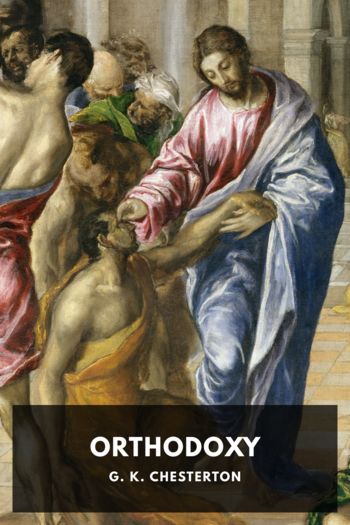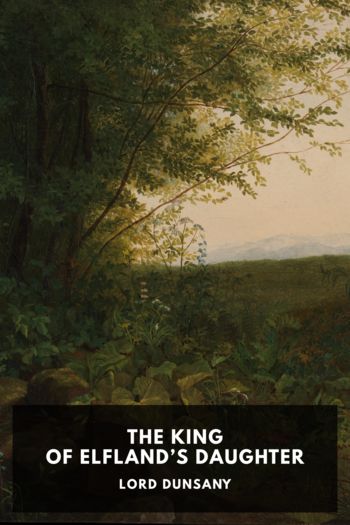Orthodoxy, G. K. Chesterton [best way to read e books txt] 📗

- Author: G. K. Chesterton
Book online «Orthodoxy, G. K. Chesterton [best way to read e books txt] 📗». Author G. K. Chesterton
The mass of men have been forced to be gay about the little things, but sad about the big ones. Nevertheless (I offer my last dogma defiantly) it is not native to man to be so. Man is more himself, man is more manlike, when joy is the fundamental thing in him, and grief the superficial. Melancholy should be an innocent interlude, a tender and fugitive frame of mind; praise should be the permanent pulsation of the soul. Pessimism is at best an emotional half-holiday; joy is the uproarious labour by which all things live. Yet, according to the apparent estate of man as seen by the pagan or the agnostic, this primary need of human nature can never be fulfilled. Joy ought to be expansive; but for the agnostic it must be contracted, it must cling to one corner of the world. Grief ought to be a concentration; but for the agnostic its desolation is spread through an unthinkable eternity. This is what I call being born upside down. The sceptic may truly be said to be topsy-turvy; for his feet are dancing upwards in idle ecstacies, while his brain is in the abyss. To the modern man the heavens are actually below the earth. The explanation is simple; he is standing on his head; which is a very weak pedestal to stand on. But when he has found his feet again he knows it. Christianity satisfies suddenly and perfectly man’s ancestral instinct for being the right way up; satisfies it supremely in this; that by its creed joy becomes something gigantic and sadness something special and small. The vault above us is not deaf because the universe is an idiot; the silence is not the heartless silence of an endless and aimless world. Rather the silence around us is a small and pitiful stillness like the prompt stillness in a sick room. We are perhaps permitted tragedy as a sort of merciful comedy: because the frantic energy of divine things would knock us down like a drunken farce. We can take our own tears more lightly than we could take the tremendous levities of the angels. So we sit perhaps in a starry chamber of silence, while the laughter of the heavens is too loud for us to hear.
Joy, which was the small publicity of the pagan, is the gigantic secret of the Christian. And as I close this chaotic volume I open again the strange small book from which all Christianity came; and I am again haunted by a kind of confirmation. The tremendous figure which fills the Gospels towers in this respect, as in every other, above all the thinkers who ever thought themselves tall. His pathos was natural, almost casual. The Stoics, ancient and modern, were proud of concealing their tears. He never concealed His tears; He showed them plainly on His open face at any daily sight, such as the far sight of His native city. Yet He concealed something. Solemn supermen and imperial diplomatists are proud of restraining their anger. He never restrained His anger. He flung furniture down the front steps of the Temple, and asked men how they expected to escape the damnation of Hell. Yet He restrained something. I say it with reverence; there was in that shattering personality a thread that must be called shyness. There was something that He hid from all men when He went up a mountain to pray. There was something that He covered constantly by abrupt silence or impetuous isolation. There was some one thing that was too great for God to show us when He walked upon our earth; and I have sometimes fancied that it was His mirth.
ColophonOrthodoxy
was published in 1908 by
G. K. Chesterton.
This ebook was produced for
Standard Ebooks
by
Justin Disney,
and is based on a transcription produced in 2005 by
Jonathan Ingram, Clare Coney, and The Online Distributed Proofreading Team
for
Project Gutenberg
and on digital scans available at the
Internet Archive.
The cover page is adapted from
Christ Healing the Blind,
a painting completed in 1570 by
El Greco.
The cover and title pages feature the
League Spartan and Sorts Mill Goudy
typefaces created in 2014 and 2009 by
The League of Moveable Type.
The first edition of this ebook was released on
April 26, 2021, 9:21 p.m.
You can check for updates to this ebook, view its revision history, or download it for different ereading systems at
standardebooks.org/ebooks/g-k-chesterton/orthodoxy.
The volunteer-driven Standard Ebooks project relies on readers like you to submit typos, corrections, and other improvements. Anyone can contribute at standardebooks.org.
UncopyrightMay you do good and not evil.
May you find forgiveness for yourself and forgive others.
May you share freely, never taking more than you give.
Copyright pages exist to tell you can’t do something. Unlike them, this Uncopyright page exists to tell you, among other things, that the writing and artwork in this ebook are believed to be in the U.S. public domain. The U.S. public domain represents our collective cultural heritage, and items in it are free for anyone in the U.S. to do almost anything at all with, without having to get permission. Public domain items are free of copyright restrictions.
Copyright laws are different around the world. If you’re not located in the U.S., check with





Comments (0)